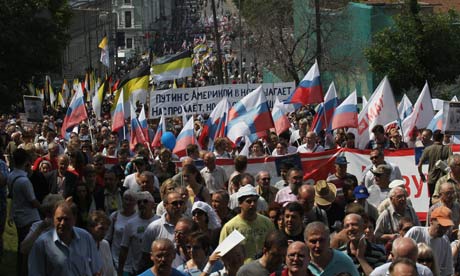
Russian anti-Putin opposition activists coincided their protest march with 'Russia day', a national holiday Photograph: Sasha Mordovets/Getty Images
Tens of thousands of people took to the streets in Russiaon Tuesday in the first major demonstrations against the government since Vladamir Putin was sworn in as president on 7 May.
Despite thunderstorms and the absence of key opposition figures, the "March of Millions" went ahead in the capital – a day after searches conducted by armed police in the homes of opposition activists and their families. Leading activists, including blogger Aleksei Navalny, socialite Ksenia Sobchak, and liberal organiser Ilya Yashin, were prevented from attending because they had been summoned for questioning by Russia's Investigative Committee in connection with the violence at the last rally on 6 May.
But Yashin, speaking to the Guardian after he was released on Tuesday evening, indicated that the move may have succeeded only in raising the profile of the rally. "The investigators did all they could to increase the amount of people that came today," he said.
While official estimates put the number of participants at 18,000, organisers claimed between 100,000 and 200,000 people had turned out. A similar march in Saint Petersburg attended by several thousand was halted by police and its organisers arrested after it over-ran its allotted time.
Smaller marches took place across Russia. An activist from Astrakhan, Oleg Shein, who shot to fame for his 40-day hunger strike against electoral fraud this year, was arrested during an unsanctioned rally in the southern Russian city.
In Moscow the weather played a role in dampening tempers with thunder and lightning at the beginning of the march and a torrential afternoon downpour that all but cleared the rally site an hour and half before the planned finishing time.
The atmosphere was darker than that at similar mass demonstrations over the winter months that began after allegations of large scale vote rigging during parliamentary elections in December. While previous gatherings have been marked by their creativity, fewer witty homemade placards were visible this time.
"The rallies [before Vladimir Putin was elected president] were almost festivals," said Nikolai Kharikonov, who was wearing a white ribbon, the opposition symbol. But the mood today was different, he said, "I am completely sick of Putin power."
Actions taken by the authorities in recent months, including a controversial new law increasing fines 150-fold for protestors, the arrests of 13 people allegedly involved in attacking riot police on 6 May and the previous day's searches, helped boost protestor numbers.
"I came because of the stupid law on protests and the searches," said 49-year old Alexander. "The authorities have initiated an escalation of the conflict."
Former deputy prime minister Boris Nemtsov avoided a police search on Monday because he was not at home, but he was issued a summons to questioning immediately after addressing the crowd on Moscow's Prospekt Sakharova. Protestors booed and jeered when the news was announced.
Most of the leaders being questioned had been allowed to leave by police by yesterday evening, but Navalny remained in custody and was escorted to the office of his Anti-Corruption Fund so he could be present while it was searched.
Some protestors arrived at Tuesday's event prepared for confrontation. A taxi driver arrested during the violence at last month's protest and who gave his name as Vycheslav showed a knife that he had managed to slip through the police metal detectors. "I don't intend to use it though," he said.
A wide range of political groups were present from anarchists, communists and gay right activists to nationalists, opponents of internet piracy laws and supporters of the jailed members of feminist punk band Pussy Riot.
Nationalists demonstrators wearing the white, yellow and black of Imperial Russia were particularly prominent. They formed columns led by men and women in black uniforms accompanied by drums and chanted slogans including "Russia, Forward!" and "Russian Order for Russian People."
Tuesday was also Russia Day, an annual commemoration of the emergence of the Russian Federation from the break-up of the Soviet Union. In honour of the national holiday Putin spoke to a select audience in the Kremlin at about the same time as the day's opposition march was taking place.
"Various points of view are being expressed about Russia today and Russia's future," he said. "Such heated discussions are normal for a free, democratic country."
But opposition leaders warned from the stage that the window for discussions was almost closed. "The time of slogans is passing," Duma deputy Ilya Ponomarev, who received some of the biggest cheers of the day, told protestors.
Police investigators were working to a political agenda in their focus on opposition leaders, said Yashin, and they appeared to be preparing criminal cases against Navalny, Left Front leader Sergei Udaltsov and himself.
But yesterday's demonstration showed that the protest mood among Russia's middle classes had not faded, according to political analyst Pavel Salin.
"The situation is ideal for the opposition leaders," he said. "We live in the 2010s and not the 2000s and they are more turbulent and less predictable."
The opposition will now take a summer break. The next mass protest is planned for 7 October, Putin's birthday.

No comments:
Post a Comment